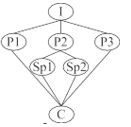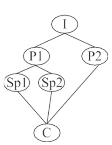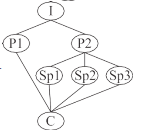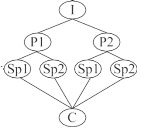1 . Human activity is changing the surface and temperature of the planet. But new research shows it is also changing the sound of the Earth’s oceans and seas.
Scientists say the changes in the sounds of our oceans and seas affect many marine(海洋) animals—from very small fish to huge whales. Sound travels “very far underwater,” Francis Juanes told the reporter. Juanes is an ecologist at the University of Victoria and co-writer of the recent research published in a magazine. “For fish,” he explained, “sound is probably a better way to sense their environment than light.”
Sounds help fish and other marine animals survive. They use sounds to communicate with each other. Sounds also help some ocean animals find food and avoid their hunters. Many ocean animals use sounds to find good places to give birth. However, increased noise from humans is making it harder for these animals to hear each other. The noise comes from shipping traffic, underwater oil and gas exploration, offshore construction, and other noisy human activity.
“For many marine species, their attempts to communicate are being masked by sounds that humans have produced,” said Duarte. The marine ecologist at the Red Sea Research Center co-wrote the paper with Juanes. The Red Sea, Duarte said, is one of the world’s most important shipping passages. It is full of large ships traveling to Asia, Europe, and Africa. Some fish and other animals, he said, now avoid the noisiest areas. Also, the overall number of marine animals has gone down by about half since 1970. In some parts of the ocean, scientists now record “fewer animals singing and calling than in the past—those voices are gone,” said Duarte.
Juanes and Duarte examined studies and research articles about changes in noise volume(音量) and frequency in the world’s oceans. Then they put together a detailed picture of how the ocean soundscape is changing and how marine life is affected.
Climate change, the researchers found, also affects physical processes that shape ocean sounds. These include such things as wind, waves, and melting ice.
Some studies suggest that noise may cause hearing loss of marine animals. Besides, many marine animals are showing higher levels of stress due to noise, which might also affect the immune(免疫) system.
Scientist Juanes says sound pollution may be easier to deal with than other ocean threats. “In theory,” he said, “you can turn down or turn off the sound immediately. It’s not like plastics or climate change, which are much harder to undo.”
1. What can we learn from the passage?| A.Sound noise may result in hearing loss of human beings. |
| B.Sound pollution killed most of the marine animals in the Red Sea. |
| C.Sound noise can influence the communication of marine animals. |
| D.Sound is unlikely to be a better way to sense their environment than light. |
| A.Channel. | B.Address. |
| C.Industry | D.Company. |
| A.what is the main cause of climate change |
| B.what should be done to reduce sound pollution |
| C.how to record changes in noise volume and frequency |
| D.how to enhance the immune system of marine animals |
| A.The Future of Oceans Exploration |
| B.The Changes in the Sounds of Oceans |
| C.Sounds Help Marine Animals Survive |
| D.Humans are Making Oceans Too noisy |
2 . Nick Torrance, a junior in high school, suffers from muscular dystrophy, and attends school in a specialized wheelchair. The muscle disease prevents him from accomplishing many everyday tasks, such as carrying his books and putting things away in his locker. So he had a fellow student assigned to help him. But Amy Smith, the school’s occupational therapist, thought that being able to do something simple like opening his locker on his own would be empowering.
Amy initially thought they would be able to buy a device to help. But searching online turned up nothing that could meet their needs—everything needed a keycode or some other physical action, things her disabled student couldn’t do. After the outside search for a method came up short, she looked within the school itself for an answer. Amy turned to the school’s robotics instructor.
The instructor, in turn, suggested that two of his most capable students take on the project: Micah Stuhldreher and Wyatt Smrcka. They took first place in a national robotics competition, so they were a natural choice to tackle the locker door problem with a robotics solution. Micah and Wyatt wasted no time getting down to work and for an hour each school day, the boys brainstormed, built, and rebuilt various versions of the device until they landed on the perfect solution one year later.
Like in any device development, it took a lot of trial and error for Micah and Wyatt to make something that would work for their target audience. For example, they initially built a locker-opening button, but Nick wasn’t strong enough to push it, so they replaced it with a sensor.
Now, between classes Nick steers his electric wheelchair to his locker and waves his hand over a sensor on the arm of the wheelchair. A few seconds later, the locker door swings open. Another wave closes the door. Nick can make it with ease—it may be a small thing, but it gives him a sense of independence.
1. Why did Amy Smith want a device?| A.To increase her student’s confidence. | B.To encourage cooperation at school. |
| C.To inspire a robotics invention. | D.To help treat a muscle disease. |
| A.move around easily | B.put his things away |
| C.continue his schooling | D.open and close his locker |
| A.Caring and passionate. | B.Talented and ambitious. |
| C.Sensitive and insightful. | D.Humble and warmhearted. |
3 . Lessons in the Lost Art of Listening
When was the last time you listened to someone? And when was the last time someone really listened to you? I once asked people what it meant to be a good listener. The typical response was a blank stare.
Of course, technology plays a role. People find phone calls interrupting them, preferring text or wordless emoji. Besides, schools and colleges rarely offer classes or activities that teach careful listening. You can join clubs to perfect your public speaking, but who attempts to achieve excellence in listening? The loud unpleasant mixture of sounds of modern life also stops us from listening.
Generally, listening goes beyond simply hearing what people say. It also involves paying attention to how they say it and what they do while they are saying it, in what context, and how what they say is related to you. It’s not about merely holding your peace while someone else holds forth. Quite the opposite. A lot of listening has to do with how you respond—the degree to which you facilitate the clear expression of another person’s thoughts and, in the process, have a clear mind of your own.
Good listeners ask good questions. They engage in exploring the topic, not to divert attention. There are curious questions like “Wouldn’t you agree…?” or “Don’t you think…?” These questions have strong tendencies. They will greatly influence the other person to change his or her view. And you’d better stay away from some personal questions like “What do you do for a living?” or “What part of town do you live in?” Just try to find out what excites people. Ask about the last movie they saw or for the story behind a piece of jewelry they’re wearing. Also good are expansive questions, such as, “If you could spend a month, where would you go?” Research indicates that when people who don’t know each other well ask each other this type of question, they feel more connected than if they spend time together achieving a task.
Because our brain can think a lot faster than people can talk, be careful with the tendency to take mental side trips when you are listening. Smart people’s attention is easily taken away by their own runaway thoughts. They may also assume they already know what the other person is going to say.
The reward of good listening will certainly be more interesting conversations. Researchers have found that attentive listeners receive more information from speakers, even when they don’t ask any questions. We are, each of us, the sum of what we attend to in life. The gentle voice of a mother and the criticism of a boss both ultimately form and shape us. And to listen poorly, selectively or not at all limits your understanding of the world and prevents you from becoming the best you can be.
1. One of the factors that influence listening is that ________.| A.our confidence in listening is decreasing | B.our speech creates a lot of noise around us |
| C.listening skills are seldom taught in school | D.texting causes a better effect than phone calls |
| A.Why the art of listening gets lost by itself. | B.Why effective methods are used in listening. |
| C.How people make themselves well understood. | D.How people can reclaim the lost art of listening. |
| A.Avoid being absent-minded. | B.Come up with curious questions. |
| C.Focus on the speaker’s personal information. | D.Try to find common interests with the speaker. |
| A.Listening and speaking deserve equal attention. |
| B.Good listeners maximize the benefits for themselves. |
| C.Bad listening ultimately contributes to people’s failure. |
| D.Listeners’ clear mind facilitates speakers’ expression of thoughts. |
4 . The Impossible Burger is entirely free of meat. But it looks, smells, feels and-most importantly-tastes so much like real hamburger beef. In fact, plant-based burger alternatives have set off a strong resistance from the beef industry. The Center for Consumer Freedom, a nonprofit that advocates on behalf of the fast food and meat industries has launched an "informational" campaign targeting plant-based meats. The campaign has included TV and online ads, as well as print ads in newspapers. The ads seem to imply that not only is an artificial burger too processed, but that it might be even less healthy than the average beef burger.
While it's true that a plant-based meat alternative is processed and it's true that eating one is not as healthy as a pile of raw vegetables, it's best to take the ads with a generous pinch of salt.
For instance, the additives and preservatives in plant-based meat highlighted in one ad sure sound scary. Who wants something called titanium dioxide(二氧化钛)in their meal? But the truth is that additives such as those listed in the ads are regularly used in all sorts of packaged foods. And if methylcellulose, a food thickener, sounds unpleasant, it's really nothing compared with salmonella(沙门菌)poisoning you can get from regular meat.
Also, the ad campaign misses the bigger point. Choosing an Impossible or Beyond burger isn't just about healthy eating Burgers, whether they are made from processed pea protein or processed meat, will never be as healthy as organic raw vegetables.
What's appealing is the prospect or enjoying a juicy burger without the bitter aftertaste of guilt.
Let's face it, there are huge environmental costs to eating cows. Cattle raising is contributing to climate. change, and not just because methane(甲烷)from cows and cattle is responsible for about 14.5% of greenhouse gas. More broadly, our global food production system releases more than a third of the world's greenhouse gases. Yet we can't seem to control our meat appetite even knowing that large areas of the Amazon forest have been ruined, and continue to be cut down to make room for more cattle to feed the growing demand for beef. Humans also know full well that many animals live short, cruel lives in awful conditions for the purpose of becoming foods for humans to enjoy at dinner.
A plant-based meat that satisfies meat desires and delivers protein but with a smaller climate footprint is a potential environmental game changer and the reason Impossible Foods was one of those receiving the UN, Global Climate Action Award in 2019. No wonder the meat industry is on guard.
1. What does the underlined sentence in Paragraph 2 most probably mean?| A.These ads deserve little consideration. |
| B.We should spread the message of these ads. |
| C.These ads tell people a lot about plant-based burgers. |
| D.We'd better be cautious when reading these ads |
| A.Their use is within the normal range. |
| B.They are likely to cause poisoning. |
| C.They are used to ensure burgers taste good |
| D.Some have not been used in hamburgers. |
| A.Doubtful | B.Supportive | C.Disapproving. | D.Neutral |
I: Introduction P: Point Sp: Sub-point(次要点) C: Conclusion
A. | B. |
C. | D. |
5 . Most people have been taught that losing weight is a matter of simple math. Cut calories—specifically 3,500 calories, and you’ll lose a pound. But as it turns out, experts are learning that this decades-old strategy is actually pretty misguided. “This idea of ‘a calorie in and a calorie out’ when it comes to weight loss is not only outdated, it’s just wrong,” says Dr. Fatima Cody Stanford, an obesity specialist at Harvard Medical School. The truth is that even careful calorie calculations don’t always yield(产生) uniform results.
How your body burns calories depends on a number of factors. Three factors affect how your body processes calories.
Your gut microbiome (肠道微生物). Trillions of organisms live in your gut, and the important types may influence how many calories your body absorbs from food. This may occur because some types of organisms are able to break down and use more calories from certain foods than other types of organisms. Researchers have found that people who are naturally thin have different types of organisms living inside them than those who are overweight.
Your metabolism (新陈代谢). Each body has a “set point” that governs weight, says Dr. Stanford. This set point reflects several factors, including your genes, your environment, and your behaviors. A region at the base of your brain stands guard to keep your body weight from dipping below that set point—which is not really a bonus if you’re trying to lose weight.
The type of food you eat. Your food choices may also influence your calorie intake, and not just because of their specific calorie content. One 2019 study published in Cell Metabolism found that eating processed foods seems to spur people to eat more calories compared with eating unprocessed foods.
If counting calories isn’t a dependable way to manage your weight, what can you do to shed extra pounds? Dr.
Stanford recommends the following.
Focus on diet quality. When planning your meals, focus on choosing unprocessed foods, including lean meats, whole grains, and lots of fruits and vegetables in their natural form.
Exercise regularly. Aim to get at least 150 minutes of moderate-intensity exercise each week. Moderate exercise is done at a level where you can talk, but not sing.
Consult a professional. “A lot of people believe it’s a moral failing if they are unable to lose weight,” says Dr. Stanford. But it’s not. As with other medical conditions, many people will need help from a doctor. Successful weight loss may require more than just diet and exercise. “Only 2% of people who meet the criteria for the use of anti-obesity medications actually get them. This means that 98% of people who could be treated aren’t,” she says, “Don’t be afraid to seek help if you need it.”
1. What can we infer from Paragraph 1?| A.Old theories actually mislead us. |
| B.Losing weight lies in losing calorie. |
| C.Calorie calculations lead to good results. |
| D.Losing weight by losing calorie is outdated. |
| A.choose the types of food you consume |
| B.focus on the quality of your diet |
| C.adjust your brain to the “set point” |
| D.reduce the organisms living in your gut |
| A.weigh | B.produce |
| C.lose | D.cost |
| A.cutting calories is essential for weight loss |
| B.losing weight can be double-edged |
| C.healthy eating keeps you losing weight |
| D.a healthy lifestyle is key to weight loss |
6 . What does it mean to live a good life? This question has been debated for centuries. In the field of psychology, two main concepts of the good life have been quite popular: A happy life full of pleasure and positive emotions, and a meaningful life full of purpose and sacrifice. But what if these aren’t the only options?
In recent years, a long-neglected version of the good life has been receiving greater attention: the psychologically rich life. It is full of complex mental engagement, a wide range of intense and deep emotions, and diverse, novel, surprising and interesting experiences. Sometimes they are neither pleasant nor meaningful. However, they are rarely boring or monotonous.
After all, both happy and meaningful lives can become monotonous and repetitive. A person with a steady office job, married with children, may be satisfied and find his or her life meaningful and still be bored. Also, the psychologically rich life doesn’t necessarily involve economic richness. For instance, consider Hesse’s character Goldmund, who has no money but pursues the life of a free spirit.
Research has found psychological richness is related to, but partially distinct from, both happy and meaningful lives. Psychological richness is related with openness to experience and experiencing both positive and negative emotions more intensely. But is the psychologically rich life one that people actually want?
In a new study, Oishi and his colleagues asked people in nine countries the degree to which they value a psychologically rich life, a happy life and a meaningful life. They found many people’s self-described ideal lives involve psychological richness. When forced to choose a life, however, the majority chose a happy life and a meaningful life. Even so, a minority of people still favored the psychologically rich life, ranging from 6.7% in Singapore to 16.8% in Germany.
These numbers went up when the desire for a psychologically rich life was measured indirectly. To understand what a person wishes their lives might have been, it is important to explore what people wish they had avoided in their lives. When asked what they regret most and whether undoing this event would have made their lives happier, more meaningful or psychologically richer, about 28% of Americans said undoing the regrettable event would have made their lives psychologically richer.
These findings suggest that while most people strive to be happy and have meaning in their lives, a sizable number of people are content merely living a psychologically rich existence.
As Oishi and his colleagues conclude, “We believe that taking the psychologically rich life seriously will deepen and enrich our understanding of well-being.” At the end of the day, there is no one singularly acceptable path to the good life. You have to find a path that works best for you.
1. According to the passage, the psychologically rich life _______.| A.means living a luxurious life |
| B.involves various intense emotions |
| C.combines pleasure with purpose |
| D.emphasizes openness and repetition |
| A.The Germans prefer psychological richness to a happy life. |
| B.Undoing regrettable events has enriched many people’s lives. |
| C.A hidden desire for psychological richness exists among some people. |
| D.People with psychological richness tend to describe their lives as ideal. |
| A.purpose outweighs pleasure in terms of significance |
| B.the choice of a good life differs from person to person |
| C.a positive mindset helps us understand our well-being |
| D.we should never be content and always strive for the best |
| A.To compare different concepts of a good life. |
| B.To explain how to live a psychologically rich life. |
| C.To persuade people to attain psychological richness. |
| D.To draw attention to a less familiar version of a good life. |
7 . Photo Research
“If you want to be a better photographer, stand in front of better stuff.” Photographer Jim Richardson shared it with others. He spends a great deal of time doing photo research, looking for great locations to shoot.
Seeing a wonderful place is bread-and-butter photography—it’s just part of the job. Getting there is only half of any great photograph’s story. The other half is how the photographer prepares to capture the subject once in front of it. It is believed that groundwork is part of photography, as essential as knowing exposure and lighting or recognizing the decisive moment to take the shot. Research sounds like a boring task for many photographers, while for others digging into a subject in advance is part of the pleasure.
Philosophically, photographers seem to divide along that line. On one side are those who desire only to be in the moment. On the other side are the planners. They would never dream of going out the door without a full list of how they’re going to approach the shoot. Actually, there is a third group nowadays. They just take photos of the whole scene and do all the creative work in Photoshop after the event. Most photographers do both: research carefully to prepare their schedule and then act in the moment once on site.
Photographers should do a lot of research in order to get ready for a photographic trip. This includes creating a file for each location they are due to visit. They start a file for each place and begin to make a list of the pieces of information. Knowing what the place looks like in advance is invaluable, so it is good to hit several Internet photo sites. Besides clueing them into the photographic possibilities of the location, this can also show what angles have already become overused and which they should therefore avoid. But photographers will also find angles they didn’t expect from locations they hadn’t imagined. Armed with these they will be better prepared to push the boundaries of what they expect.
“Above all, I’ll look for places and events that are seasonal and timeless. I open my mind to what might make a great subject for a picture,” Jim said. “Most travelers tend to think only of places they’re visiting, without looking deeper into culture, history or meaning. I try to get in time with the rhythm of the place and in tune with its melody. But most of all I just want to be ready. If I’m ready, I can just about count on being lucky.”
1. What does the underlined word “capture” in Paragraph 2 probably mean?| A.Identify. | B.Record. | C.Arrange. | D.Explore. |
| A.They are unable to decide on the best plan of action. |
| B.It is possible for them to adopt flexible ways of working. |
| C.The third group is not as imaginative as some of the others. |
| D.Some of them refuse to try to understand the way others work. |
| A.Sound preparation is a must for a satisfactory photo. |
| B.One should create photo sites in a photographic trip. |
| C.Taking photos requires vivid imagination in advance. |
| D.It is essential to do photo research in central locations. |
| A.he feels good to visit those historical places |
| B.he refuses to spend too much time in one place |
| C.he is careful about choosing the right place to visit |
| D.he likes to go to places that few people bother to visit |
8 . Certain forms of AI are indeed becoming ubiquitous. For example, algorithms (算法) carry out huge volumes of trading on our financial markets, self-driving cars are appearing on city streets, and our smartphones are translating from one language into another. These systems are sometimes faster and more perceptive than we humans are. But so far that is only true for the specific tasks for which the systems have been designed. That is something that some AI developers are now eager to change.
Some of today’s AI pioneers want to move on from today’s world of “weak” or “narrow” AI, to create “strong” or “full” AI, or what is often called artificial general intelligence (AGI). In some respects, today’s powerful computing machines already make our brains look weak. AGI could, its advocates say, work for us around the clock, and drawing on all available data, could suggest solutions to many problems. DM, a company focused on the development of AGI, has an ambition to “solve intelligence”. “If we’re successful,” their mission statement reads, “we believe this will be one of the most important and widely beneficial scientific advances ever made.”
Since the early days of AI, imagination has outpaced what is possible or even probable. In 1965, an imaginative mathematician called Irving Good predicted the eventual creation of an “ultra-intelligent machine…that can far surpass all the intellectual (智力的) activities of any man, however clever.” Good went on to suggest that “the first ultra-intelligent machine” could be “the last invention that man need ever make.”
Fears about the appearance of bad, powerful, man-made intelligent machines have been reinforced (强化) by many works of fiction — Mary Shelley’s Frankenstein and the Terminator film series, for example. But if AI does eventually prove to be our downfall, it is unlikely to be at the hands of human-shaped forms like these, with recognisably human motivations such as aggression (敌对行为). Instead, I agree with Oxford University philosopher Nick Bostrom, who believes that the heaviest risks from AGI do not come from a decision to turn against mankind but rather from a dogged pursuit of set objectives at the expense of everything else.
The promise and danger of true AGI are great. But all of today’s excited discussion about these possibilities presupposes the fact that we will be able to build these systems. And, having spoken to many of the world’s foremost AI researchers, I believe there is good reason to doubt that we will see AGI any time soon, if ever.
1. What does the underlined word “ubiquitous” in Paragraph I probably mean?| A.Enormous in quantity. | B.Changeable daily. |
| C.Stable in quality. | D.Present everywhere. |
| A.Help to tackle problems. | B.Make brains more active. |
| C.Benefit ambitious people. | D.Set up powerful databases. |
| A.supportive | B.disapproving |
| C.fearful | D.uncertain |
| A.It may be only a dream. |
| B.It will come into being soon. |
| C.It will be controlled by humans. |
| D.It may be more dangerous than ever. |
9 . Stories Behind Famous Company Names
| Inventor Caleb Bradham had originally wanted to be a doctor but started working in a pharmacy when he returned home to North Carolina. In 1893, he made up what he first called “Brad’s Drink,” a mix of water, sugar, caramel, lemon oil, nutmeg, and other flavors. Five years later, he renamed it Pepsi-Cola. He claimed the drink could help with digestion(消化), or dyspepsia, the term from which Bradham adapted the name Pepsi. |
| This luxury car maker combined elements from the Ford and Oldsmobile companies when it was started in 1902 and later became known for its innovation and high quality. The company was named after the French explorer Antoine Laumet de la Mothe Cadillac, who founded the city of Detroit in 1701. |
| Company co-founder Gordon Bowker has said that while brainstorming names, someone brought out a map that featured the old mining town of Starbo. That may have led him to think of Starbuck, the first mate in Herman Melville’s famous novel, Moby Dick. Not only the company name but also the origin of its logo has aroused great curiosity. |
| The inventor of Rolex, Hans Wilsdorf, was looking to make an elegant, yet precise, wristwatch. He wanted a name that was easy to say, worked in different languages, and looked good on the watches. He settled on Rolex in 1908. |
| A.Pepsi | B.Cadillac |
| C.Starbucks | D.Rolex |
| A.Caleb Bradham aimed to cure dyspepsia with Pepsi. |
| B.Hans Wilsdorf intended Rolex to be universally accepted. |
| C.Cadillac was named after the founding father of the company. |
| D.Starbucks was used due to the co-founder’s love for his hometown. |
| A.a famous company name is easy to spell |
| B.a special story can make a company famous |
| C.a company name usually has a special meaning in it |
| D.a company name is related to the founder’s profession |







